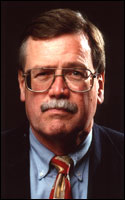New Research Shows Americans’ Love-Hate Relationship with Journalism
Contact:
George Kennedy
573-882-4045
Columbia, Mo. (April 27, 2005) — A new study shows that Americans have a more positive, more complicated set of attitudes toward journalism than the recent wave of media criticism implies.
“The consumers of American journalism respect, value and need it – but they’re also skeptical about whether journalists really live up to the standards of accuracy, fairness and respect for others that we profess,” said George Kennedy, co-author of the study and a professor at the Missouri School of Journalism.


For example, this national survey shows that, by 62 percent to 18 percent, respondents agree with the statement, “Journalism in the U.S. is mainly a force for good.” By the same 3-1 margin, respondents agreed, “I personally benefit from what journalists provide.” And by 75 percent to 12 percent, they agreed, “Journalism helps me understand what is going on in America.”
Glen T. Cameron, who holds the Maxine Wilson Gregory Chair in Journalism Research at the School, and Kennedy, designed this survey. It was conducted by the School’s Center for Advanced Social Research. The survey reached by telephone 495 respondents, selected at random. The results are 95 percent certain to be accurate within a range of 4.4 percent plus or minus. After the telephone survey, Kennedy interviewed, also by telephone, a dozen people whose responses to the survey seemed typical.However, respondents to the Missouri survey agreed with results of other national surveys that they see bias in journalism (85 percent to 13 percent); that journalists too often invade privacy (65 percent to 26 percent); and that journalism is too negative (77 percent to 22 percent).
The study is part of a project with the working title “What Good is Journalism?”, which will include a public forum on Wednesday, April 27, in Arlington, Va., and a book to be published within the next year. The public forum is co-sponsored by the First Amendment Center.
Kennedy said that what distinguishes this study from the dozens of recent surveys showing disdain and distrust of journalism is that this one asked, along with the usual questions, a number of questions other surveys haven’t included.
“We wanted to find out whether journalism actually serves any useful purposes in people’s lives, and what those purposes might be,” he said. “We also, of course, wanted to assess whether people believe what they read or hear.”
The survey and the follow-up interviews show that, by significant margins, Americans do think journalism is important and that they do trust what journalists tell them, though with some reservations.
One survey respondent who agreed to be interviewed was Kimberly Huggins, a 25-year-old candy store owner in Georgia. Her assessment seems to be widely shared: “There are a lot of outrageous things, but how do you curb the outrageous things without getting in the way of things we need to know? It’s good to know what’s going on.”
In the survey, respondents agreed, by 93 percent to 4 percent, that “the freedom of the press is important to our system of government.” Asked whether journalists have too much or too little of that freedom, 14 percent of respondents said “too little;” 23 percent said “too much;” and 60 percent said “about the right amount.”
By 62 percent to 19 percent, respondents agreed with the statement “In general, American journalism is credible.” Newspapers were rated trustworthy by 56 percent to 26 percent; television by 57 to 25 percent.
Respondents strongly supported the investigative, or watchdog, role of journalism. By 83 percent to 8 percent, they agreed, “It is important for journalists to press for access to information about our government, even when officials would like to keep it quiet.” They were less positive about how well journalists exercise that role; 65 percent rated journalists “good watchdogs over public officials,” and 59 percent said journalists are “good watchdogs over business practices.” By 53 percent to 28 percent, respondents agreed that “journalists do a good job of protecting the public from abuses of power.”
Like respondents to other surveys, those who participated in this study found plenty to criticize, as well. By 74 percent to 18 percent, they said journalists tend to favor one side over the other in political and social issues. Of the 85 percent who said they see bias in the news, 48 percent identified that bias as liberal; 30 percent identified it as conservative.
Respondents also said, by 70 to 22 percent, that they think journalists are “often influenced” by “powerful people and organizations.” Half said they find American journalism “too sensational,” with 7 percent finding it “too restrained” and 40 percent finding it “about right.”
This complicated mix of support and skepticism was summed up well by David Hudson, a 47-year-old computer network manager in Alabama. Hudson said, “Journalism may be slanted, but it’s the best way to get the news. If you take away journalism, you’d want it back with whatever flaws it has.”
Updated: April 6, 2020